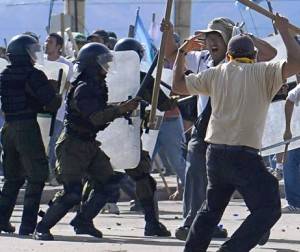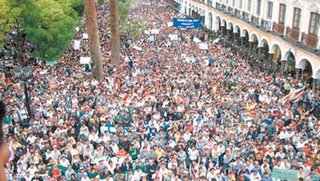MAS Proposes Plan, Clashes Erupt in Cochabamba
On Wednesday Bolivia's government agreed to opposition demands that any changes to the country's constitution must pass with two-thirds support in the Constituent Assembly.
President Morales proposed a compromise plan that would permit any articles not decided by a two-thirds majority before a July 2 deadline, to be passed by a simple majority.
The work of the assembly had been deadlocked for months as political parties debated whether each element of the charter required a two-thirds vote. While President Morales supported constitutional amendments passed by a simple majority, four of Bolivia's nine states vowed not to recognize a constitution written in such a manner.
Opposition leaders organized protest marches and hunger strikes demanding that Morales approve a two-thirds vote for each individual article. They claimed that Morales sought to freeze them out of the new constitution with the opposition stronghold resting in the eastern department of Santa Cruz. Last month, hundreds of thousands marched through the streets of Santa Cruz de la Sierra demonstrating for the two-thirds vote.
This is a major concession for Morales and his political allies. Yet opposition parties do not support the new proposal and claimed MAS will actively stall any progress until the July deadline. The Constituent Assembly has been in session since August but its work remained at a standstill. This latest attempt to move along the constitutional process may be derailed if these factions are unable to reach agreement.
Meanwhile in Cochabamba supporters of President Morales clashed with supporters of provincial governor Manfred Reyes Villa last week, leaving two dead and at least 130 injured in the city of Cochabamba.
Tension grew as protesters blocked roads to the city for three days in an attempt to remove the governor. Fighting erupted on Thursday when Reyes Villa's sympathizers entered the city with reports indicating that armed supporters of the governor attacked the coca farmers.
The first casualty was Nicomedes Gutierrez a coca farmer. Cristian Urresty Ferrel, a student and member of the Young Democrats, a group supporting Reyes, was also killed during the violent clashes.
According to Bolivian military officials, an estimated 30,000 demonstrators from these two rival factions overran police in the streets of Cochabamba, armed with sticks and rocks. This is the latest event in a month of protests that filled the city’s streets.
Supporters of the national government have called for Reyes’ resignation amid accusations of corruption, including bookkeeping irregularities and using state funds to reward rural towns that support opponents of Morales.
In defiance of the central governemnt, Villa Reyes and five other provincial governors joined together to demand greater independence. He has called for Cochabamba to hold a second vote on the autonomy referendum - a measure that was voted down by 63 percent of Cochabambans in July of last year. The Cochabamban governor has also sided with opposition leaders who said each of the new charter's articles should be written by two-thirds of the assembly's delegates and publicly denounced Morales' handling of the rewriting Bolivia's constitution.
should be written by two-thirds of the assembly's delegates and publicly denounced Morales' handling of the rewriting Bolivia's constitution.
National and regional leaders blamed each other for the political violence. A senator supporting Morales placed responsibility for the two protestors’ deaths with Reyes, while six opposition governors joined in blaming President Morales. Tarija’s governor Mario Cossío and Luis Paredes, governor of Santa Cruz, insisted that Morales restore order in the region.
Authorities have said a force of 1,500 soldiers has been dispatched to Cochabamba, which is 125 miles southeast of La Paz.
Vice President Garcia Linera described the action of Villas’ supporters as "a provocation" and criticized Reyes for failing to “exercise control and resolve conflicts in a peaceful manner.” Last week Morales dismissed Cochabamba’s chief of police after he directed officers to fire tear gas on peaceful protestors.
Reyes’ opponents have called for a dialogue but most believe that the time has come for him to relinquish his position. He has refused to step down, stating he had no reason to resign.
However claiming to fear for his safety, Reyes fled to Santa Cruz after meeting with other opposition governors in La Paz. Hundreds of pro-Morales protesters surrounded the La Paz hotel where the governors were meeting.
President Morales, a native of Cochabamba, has called for Reyes to return to his state. Reyes Villa is one of the first elected Bolivian governors. Prior to 2005, the nine department governors were appointed by the president.
President Morales proposed a compromise plan that would permit any articles not decided by a two-thirds majority before a July 2 deadline, to be passed by a simple majority.
The work of the assembly had been deadlocked for months as political parties debated whether each element of the charter required a two-thirds vote. While President Morales supported constitutional amendments passed by a simple majority, four of Bolivia's nine states vowed not to recognize a constitution written in such a manner.

Opposition leaders organized protest marches and hunger strikes demanding that Morales approve a two-thirds vote for each individual article. They claimed that Morales sought to freeze them out of the new constitution with the opposition stronghold resting in the eastern department of Santa Cruz. Last month, hundreds of thousands marched through the streets of Santa Cruz de la Sierra demonstrating for the two-thirds vote.
This is a major concession for Morales and his political allies. Yet opposition parties do not support the new proposal and claimed MAS will actively stall any progress until the July deadline. The Constituent Assembly has been in session since August but its work remained at a standstill. This latest attempt to move along the constitutional process may be derailed if these factions are unable to reach agreement.
Meanwhile in Cochabamba supporters of President Morales clashed with supporters of provincial governor Manfred Reyes Villa last week, leaving two dead and at least 130 injured in the city of Cochabamba.
Tension grew as protesters blocked roads to the city for three days in an attempt to remove the governor. Fighting erupted on Thursday when Reyes Villa's sympathizers entered the city with reports indicating that armed supporters of the governor attacked the coca farmers.

The first casualty was Nicomedes Gutierrez a coca farmer. Cristian Urresty Ferrel, a student and member of the Young Democrats, a group supporting Reyes, was also killed during the violent clashes.
According to Bolivian military officials, an estimated 30,000 demonstrators from these two rival factions overran police in the streets of Cochabamba, armed with sticks and rocks. This is the latest event in a month of protests that filled the city’s streets.
Supporters of the national government have called for Reyes’ resignation amid accusations of corruption, including bookkeeping irregularities and using state funds to reward rural towns that support opponents of Morales.
In defiance of the central governemnt, Villa Reyes and five other provincial governors joined together to demand greater independence. He has called for Cochabamba to hold a second vote on the autonomy referendum - a measure that was voted down by 63 percent of Cochabambans in July of last year. The Cochabamban governor has also sided with opposition leaders who said each of the new charter's articles
 should be written by two-thirds of the assembly's delegates and publicly denounced Morales' handling of the rewriting Bolivia's constitution.
should be written by two-thirds of the assembly's delegates and publicly denounced Morales' handling of the rewriting Bolivia's constitution.National and regional leaders blamed each other for the political violence. A senator supporting Morales placed responsibility for the two protestors’ deaths with Reyes, while six opposition governors joined in blaming President Morales. Tarija’s governor Mario Cossío and Luis Paredes, governor of Santa Cruz, insisted that Morales restore order in the region.
Authorities have said a force of 1,500 soldiers has been dispatched to Cochabamba, which is 125 miles southeast of La Paz.
Vice President Garcia Linera described the action of Villas’ supporters as "a provocation" and criticized Reyes for failing to “exercise control and resolve conflicts in a peaceful manner.” Last week Morales dismissed Cochabamba’s chief of police after he directed officers to fire tear gas on peaceful protestors.
Reyes’ opponents have called for a dialogue but most believe that the time has come for him to relinquish his position. He has refused to step down, stating he had no reason to resign.
However claiming to fear for his safety, Reyes fled to Santa Cruz after meeting with other opposition governors in La Paz. Hundreds of pro-Morales protesters surrounded the La Paz hotel where the governors were meeting.
President Morales, a native of Cochabamba, has called for Reyes to return to his state. Reyes Villa is one of the first elected Bolivian governors. Prior to 2005, the nine department governors were appointed by the president.


0 Comments:
Post a Comment
<< Home